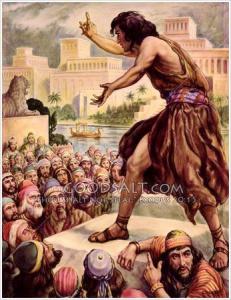“The Good News Is Not Good Business”

centralsaanichtoday.com
The Old Testament and Gospel lessons are about God’s business and ours: Jonah 3:10 – 4:11 and Matthew 20:1 – 16.
Fred Craddock tells the story of meeting a man named Frank who told Craddock, “I work hard and I take care of my family and I mind my own business.” People have a real sense of “business.” I’m reminded of the lyrics:
“And I’ll be taking care of business (every day)
Taking care of business (every way)
I’ve been taking care of business (it’s all mine)
Taking care of business and working overtime, work out.”
Jonah Doesn’t Like God’s Business
Jonah, after refusing to do God’s business, goes to Nineveh and does as commanded: And he cried out, ‘Forty days more, and Nineveh shall be overthrown!’ And the people of Nineveh believed God; they proclaimed a fast, and everyone, great and small, put on sackcloth. Is this an advertisement for short sermons? Jonah’s sermon – 8 words, shorter than a tweet. The entire city of Nineveh was converted. Should preachers pay attention?

Jonah Preaching in Nineveh www.pininterest.com
“But this was very displeasing to Jonah, and he became angry.” As far as Jonah was concerned this was not the way God should be doing business. Isn’t that just like a preacher? How many preachers are convinced that they know more than God or that God automatically should act according to their interpretations.
Last Sunday, a preacher told the congregation that slaves were not freed until they humbled themselves and learned to read the Bible. He claimed that slaveowners were men of compassion who taught their slaves to read the Bible. The examples, of course, can be multiplied.
Jonah was angry. Somehow this kind of anger doesn’t wear well on preachers. What was Jonah’s issue? I think “issue” is the right word because preachers are filled with “issues” today. Well, Jonah’s issue: He did not want foreigners converted.
Think of the issues that produce angry preachers spouting hatred: issues with transgenders, issues with books, issues with science and history, issues with politics. There are so many angry preachers among us. Are we angry that some people are being included in God’s family, the body of Jesus, and we don’t think they belong. How many Christians are still angry about gays? Angry enough to break away and start their own anti-gay denominations?
If we are angry about God’s business, I think we should rethink that. Do you see the cognitive difficulties in the text? “Jonah became angry. He prayed to the Lord.” Now, prayer is a good way to deal with anger, but after the anger, there needs to be a humble acceptance of what God says.
When God tells us that God’s business is our business, then whose business should we tending? Why, God’s business, of course.
It’s a bad look for Jonah. Then Jonah went out of the city and sat down east of the city, and made a booth for himself there. He sat under it in the shade, waiting to see what would become of the city. Get it? He’s pouting. A pouting preacher.
How does God deal with his pouting preacher? Of all things, God created a bush to give Jonah shade over his head and save him from his discomfort. I think Jonah as bald, and God gives his preacher some shade.
Unfortunately, Jonah’s face and head are still red with anger. Now God sends a worm to kill the bush. Jonah is the biblical version of a Broadway comedy. This is hilarious. Watch God teach the preacher a badly past due lesson. Then the Lord said, ‘You are concerned about the bush, for which you did not labor and which you did not grow; it came into being in a night and perished in a night. And should I not be concerned about Nineveh, that great city, in which there are more than a hundred and twenty thousand people who do not know their right hand from their left, and also many animals?”
Did Jonah learn his lesson. Did he learn that the good news is not good business for angry preachers? Jonah thought that God’s business made no common sense. He came up against a hard reality: Common sense and God’s business are not the same. “God ways are not our ways.” “God’s thoughts are not our thoughts.”
The Gospel Lesson: Pay Everyone the Same
Turning now to the gospel lesson, in the parable of the workers reporting for duty at various times, Jesus doesn’t operate on the basis of common sense. Let me make a connection for you. The philosophical grounding of Christian fundamentalism is Scottish Common Sense. Jesus and common sense are not partners. They don’t think the same way. They don’t reach the same conclusions. If you allow what you believe is your common sense to determine your Christian life, you are going to be in a different universe than Jesus. Not just a different state, region, or country – another universe. Jesus and common sense are not a matched pair.
The story of the all-day workers being paid the same as the one-hour workers doesn’t match common sense. The corporations and the unions will be outraged at this way of doing business. Cut it any way you like, “This is not good business.” Here is the clearest example in the stories of Jesus that he doesn’t traffic in common sense. Jesus uses kingdom sense.
You have to be careful making your way through decisions you make in relation to Christian faith. A wise man once said that you could find yourself fighting against God while believing you are on God’s side. God’s grace is the grace of truth refusing to hide from us the character of our envy of those whom we think undeserving. Are you may here God saying to you, “Don’t call ‘unclean’ what God has called ‘clean.’”
You have surely heard people say, “I’m just minding my own business.” We always think we are minding our own business and we don’t want someone else minding it for us.
Well, the church needs to discover whether or not we are minding God’s business.

















